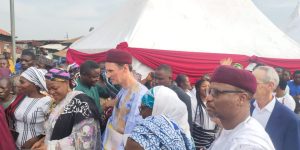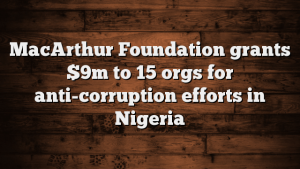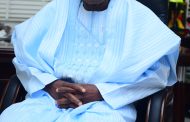By Adagbo Onoja
The language of ‘nation building’ is almost an exclusive language of great powers for whom nation building is a major foreign policy tool. That was the source of the initial mouth agape when one heard Alhaji Usman Nga-Kupi, the Chief of Garki in Abuja, Nigeria’s Federal Capital Territory who was explaining the conferment of the title of ‘Hero of Justice’ on the visiting President of MacArthur Foundation, Prof. John Palfrey, last week. The chief said it is on the ground of his visitor’s “achievements and contributions to nation building and grassroots development in the FCT.” Only an instinctive reckoning with the trouble with meaning quickly brought one back to stability. After all, the signifier does not always refer to a signified, even in the least heterogenous society.

An image from the occasion
In other words, nation building in Chief Usman Nga-Kupi’s usage is not bound to mean the same thing as Anthony Blinken or his Chinese counterpart, Wang Yi’s usage. As such, the realms of life in which MacArthur Foundation has intervened to the admiration of the chief – voice for indigenous elements from the FCT, reinvigorating the traditional justice system to the point of making sexual and gender-based molestation impracticable in the area, mobilisation of FCT indigenes against the culture of begging, making way for appointment of the indigenous folks in FCTA administration – can justify the use of nation building at that level. The chief is protected by the context-dependent nature of meaning.
But as context is not an objective thing, it means that a claim of nation building for MacArthur Foundation in Nigeria cannot rest on just examples of what the Chicago based Foundation has done for FCT indigenes. FCT indigenes constitute a crucial category in the Nigerian identity space but they still do not constitute an alternative word for Nigeria. There still have to be other examples to reinforce or challenge the chief’s weighty appraisal of MacArthur Foundation and what that triggers about leadership, emancipatory use of power and national happiness index in Nigeria. The rest of this piece is an attempt at doing that.
Around 2016, the Africa Office of MacArthur Foundation which operates from Abuja in Nigeria came to the interesting conclusion that the trouble with Nigeria is corruption. It was/is an interesting conclusion on three grounds. The first ground is that it challenged the dominant contention that the trouble with Nigeria is low quality of leadership. Notwithstanding the discursive character of the evidence, it became known that the phenomenon of fake drugs, for instance, is much less a problem of leadership as much as that of corruption. The same thing with when the country finds its purchase of military hardware derelict. Or when the supervision of road projects deliver anything but standard. It goes all the way down to accreditation of courses in schools, especially the universities. Most of the epitomes of decay are of corruption than of leadership, with many of them technology supported criminality above the control of political leadership.
Second, such a conclusion would, hitherto, be regarded as the sort of narratives of Africa structured by imperialist geopolitical codes and spatial blinkers. This time, the conclusion was based on discursive data coming from a series of conversations with some of Nigeria’s most informed, patriotic and worried citizens about where corruption was taking the country. Above all, a Nigerian led it.
The third feature which makes it interesting is what MacArthur did in response to its research finding. It assembled a campaigning team which was to develop a hegemonic consensus depicting corruption as a primary rather than a secondary contradiction. That was the first time in the history of Nigeria that containing corruption took the form of tropological warfare. First time is not necessarily the best in strategy but it widened the models of attacking corruption. How well the campaign was executed and what lessens have been learnt must be part of MacArthur’s review processes by now but it brought out a hitherto unexplored option. Of course, it is true that the Federal Government of Nigeria conduct a permanent war against corruption through its vast media outlet. That must be recognised and appreciated but without forgetting to insist on a distinction between a campaign of preachment or exhortation and a war of strategic stories aimed at a hegemonic reframing of corruption. The two things are not comparable. One is based on referentiality of meaning, the other one on relationality of meaning.
 In a country with Nigeria’s culture of fighting corruption, there is basis for critical celebration of the discourse approach that MacArthur Foundation had introduced. Nigeria’s culture of fighting corruption is not so much about prevention but punishing those who might be caught. That strategy ignores the tendency of every reality to reify itself, sometimes too quickly as to leave the society far behind. That is exactly what has happened: those who could not resist the temptation to loot the public treasury moved fast enough to block punishment of the act, leaving Nigeria wailing endlessly but impotently about corruption.
In a country with Nigeria’s culture of fighting corruption, there is basis for critical celebration of the discourse approach that MacArthur Foundation had introduced. Nigeria’s culture of fighting corruption is not so much about prevention but punishing those who might be caught. That strategy ignores the tendency of every reality to reify itself, sometimes too quickly as to leave the society far behind. That is exactly what has happened: those who could not resist the temptation to loot the public treasury moved fast enough to block punishment of the act, leaving Nigeria wailing endlessly but impotently about corruption.
That culture has a cousin in the idealism that political office holders should and must do their duties without being corrupt even as they are the ones whose signature will make billionaires of their brothers, in-laws, classmates and kin who chose to be consultants, contractors and related realms. When the Federal Civil Service was the engine room of government and governance, that worked well. Ministers and other political appointees were kept in check by civil servants. It did not take long before the military establishment who had also taken over the political administration of Nigeria interpreted the institutional powers of civil servants to check corruption to mean that the civil servants had become too powerful for the Nigerian State. As is always the case, they then took steps to cut the civil servants to size. The civil servant has not found his or her voice since the purge of the mid-1970s. With the civil servant out of the way, corruption now sits atop the table, with no one around to challenge it. Is it not interesting that no one has mentioned retraining of the civil service to restore that institutional role in Nigeria’s anti-corruption rhetoric?
Is it not also interesting that no Chairman of the Economic and Financial Crimes Commission (EFCC) – Nigeria’s leading anti-graft body – has left that office intact? Abdulrasheed Bawa, the immediate past Chairman, was released around the third week of October 2023 after 100 days in detention. That has been the story of every other past Chairman of the EFCC, with minor differences, proof that corruption sits on Nigeria basically unchallenged. Only Mallam Nuhu Ribadu, the current National Security Adviser, has been able to reinvent himself after being roughened up in the aftermath of his stint as EFCC pioneer Chairman.
It is an act of nation building to innovate on containing corruption in a nation held hostage by corruption. To that extent, MacArthur’s intervention in tackling corruption in Nigeria is adequate to confirm the claim of the Chief of Garki about MacArthur Foundation and nation building in Nigeria. It is confirmatory in a qualitative rather than quantitative sense. In other words, we do not need a heap of facts and figures of other activities of MacArthur across Nigeria to claim confirmation after having made a distinction between preachy or tame campaign against corruption and the alternative pathway of strategic stories.
It is up to a society trapped in corruption as Nigeria is to acknowledge those adding any value at all to containing corruption like MacArthur Foundation. Why should it do so? Simply because corruption in Nigeria has confirmed something that the late Dr Ibrahim Tahir warned against and which has happened almost exactly as the sociologist said it. Although it was never a secret, it has, nevertheless, become a quotation that should no longer be bandied about casually because of its performative implications. Yet, Ibrahim Tahir said what he said to a cream of Nigeria’s power elite at a PDP function very early after their ascendancy in 1999. Not only did Nigerian leaders ignore such a stark warning, they have been unable to give a thought to a plausible way out also by Dr Tahir. He wanted Nigeria to close all files on corruption with a view to starting afresh. He did not rule out negotiation of looted funds between suspected looters and the Nigerian government but he did not want an elite weighed down by their conscience but who have no idea of how to get out of that conscience crisis.
Lastly, who knows if MacArthur is not serving as an early warning to all who might be stuck in the mud called corruption? The postmodern world is a world in which what is dangerous is not anymore easy to figure out, much less anticipate. In the postmodern world, where danger comes from cannot be guestimated, much less predicted. It is most likely that the Nigerian judicial establishment did not anticipate or predict the verbal missiles unleashed by a retiring Justice recently. That is one of their best bred members, taking to an open forum to naked that establishment. That is the uncertainty and unpredictability that define the world today, speaking to the imperative of open, democratic practices rather than fear of one’s shadows, imaginary enemies and spectres.
In all, there is something to thank the Chief of Garki for reminding Nigeria of what the giant of Africa might be taking for granted. It is in the anti-corruption case study cited but it is even more in the recognition that a disempowered group – indigenous, ethnic, religious, gender and so on – does not necessarily have to write petitions or organise protests before a social order hears their screams. That is really the emancipatory statement for everyone else – government of Nigeria, FCT, civil society, media, academics – in MacArthur’s works in the FCT community!
Onoja is of the School of International Relations, University of St Andrews, Scotland




























